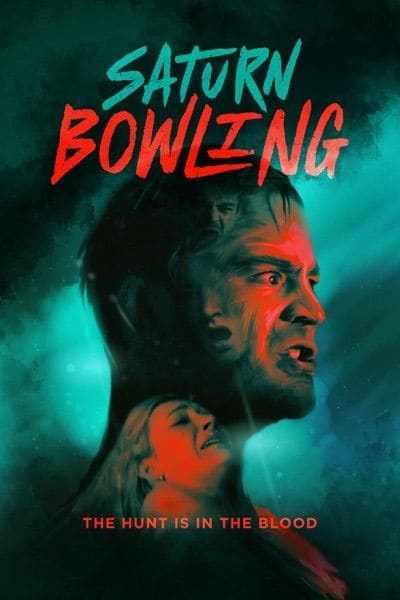Eye For Film >> Movies >> Saturn Bowling (2022) Film Review
Saturn Bowling
Reviewed by: Jennie Kermode

An extraordinary piece of work which has drifted around the edges of the festival circuit this year getting more praise than opportunity, perhaps because it feels too dark and too overwhelming even to fit into most horror programming, Saturn Bowling is a serial killer story with a distinctly female gaze, and it’s devastating. With an immersive quality which recalls the early work of Michael Mann, it keys in to the ordinariness of certain kinds of horror and the ease with which they can take root in a society in which many men teeter on the edge of a moral abyss.
Overshadowed by the presence of a tyrannical father who has recently died, the film follows his two sons as they engage with what he has left behind. It opens with the younger one, Armand (Achille Reggiani), walking down the street at night eating a burger as he is approached and then followed by a car, an unsettling scene which hints at what is to come. In due course we discover that the driver of the car is Guillaume (Arieh Worthalter), his brother, who is also a police officer. Truman Capote’s phrase ‘one day he stood up and went out the back door, while I went out the front,’ springs to mind. Both men have evident anger issues. Guillaume tells Armand about their bereavement through the rolled-down window. “I’m eating,” Armand protests, otherwise unperturbed.

Initially, Armand wants nothing that was his father’s. Known as the bastard son whom the old man wouldn’t talk about, he seems determined to make his own way in life. What changes his mind seems to be sexual frustration and the idea that running the family bowling alley, as Guillaume suggests, could impress women. He gets an apartment into the bargain, with a big, friendly, resident dog. The apartment walls are covered in hunting trophies and photographs of men on safari posting with their kills. Downstairs, some of the men linger, declaring the space theirs. They expect to eat for free. Because Guillaume has allied himself with them, there is little Armand can do, which adds to his frustration.
It’s easy to feel sympathy for a man in position. Reggiani is very effective in conveying vulnerability. Armand doesn’t seem to have a friend in the world. Director Patricia Mazuy warns us early on, however, that we should treat him with caution. Alone in the car park, he spots a piece of fabric billowing out of a car window. The camera captures it in a curiously sensual way. Breaking into the car, he caresses it, and when the owner returns, he asks her a question which, whilst unlikely enough to make one wonder if he’s sober, is also alarming. She keeps her wits about her and handles the situation, but you will immediately find yourself wondering what might have happened.
The gulf between what (most) men and women recognise as warning signs is a theme which Mazuy builds on throughout the film. Whilst he can at times be lighthearted and very disarming, Armand is clearly going through a process of escalation. What really makes the film interesting is that Guillaume is doing something similar, each man’s choices affecting the other. Guillaume finds an anchor in animal behaviourist Xuan (Y-Lan Lucas), a woman whom the hunters despise, but even their interactions seem perpetually at risk of spilling out of control. Mazuy lets viewers drift along with them so that it takes the abrupt intervention of a third party to restore some perspective. “Putain!” Guillaume shouts in anger, a telling choice of word.
Mazuy’s camera is unflinching yet never gratuitous. A brief supporting performance from Leila Muse sears into the screen, so vibrant, so very alive that you’ll find it hard to take your eyes off her. Armand can’t either. What follows, though initially erotic, is all about the acting, a brilliantly composed study of tactile communication which, when it turns, is given an additionally disturbing quality by the anguished noises of the dog. Afterwards, we stay with Armand at a point when almost any other director would cut away, following his actions for a good ten minutes, watching his face, the shifting pattern of his emotions. The focus becomes not the brief release he finds in violence but the deep, crushing unhappiness which inspires it, which cannot be abated for long, even at such a terrible cost.
Atmosphere is everything. The drabness of the car park, of the graveyard where Guillaume strains to attend to his father, and finds fresh corpses. The stolen beauty of wild animals in the hunters’ videos, a subject of constant reminiscence and seemingly the only real joy in their lives. Armand dresses in his father’s clothes and can’t shake his ghost. In one chilling scene, a comparison of corpses emphasises what has been lost and maps out a process of decay from which nothing can escape.
When the credits roll, you will want to go and shower. You will want to forget, but Mazuy won’t let you, because this matters. For all the ugliness it deals with, it is a compelling piece of work, the more powerful because it is rooted in small things which many women experience day to day, and it makes no room for forgiveness.
Reviewed on: 22 Oct 2023















